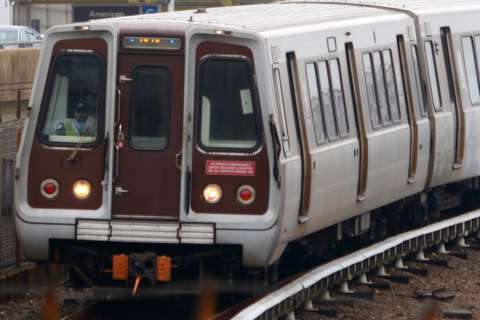WASHINGTON – Maryland is set to take a significant step Tuesday toward providing new dedicated funding for Metro, as the rail system marks 42 years since the first stations opened.
The Maryland Senate’s Budget and Taxation Committee is set to hear the state’s Metro funding bill Tuesday afternoon. House and Senate leaders, along with Gov. Larry Hogan, have indicated they will support amending the bill to provide the state’s full $167 million share of $500 million in new dedicated funding for Metro. The funding would come from the statewide transportation trust fund.
Metro General Manager Paul Wiedefeld has said the new dedicated money, alongside existing contributions, will allow for major maintenance, repairs and upgrades over the next decade that had been put off for years.
The D.C. Council expects to pass its own $178 million share, as determined by an existing Metro funding formula, later this spring.
While a number of D.C. leaders feel the increased costs to the District are unfair to D.C. taxpayers, Virginia’s attorney general’s office believes following the formula protects against any potential legal challenges to providing tax dollars that could fund projects that cross state lines, Virginia Transportation Secretary Shannon Valentine said last week.
Concerns over the sources of Virginia’s share
Virginia leaders are still wrestling with exactly how to provide their share of the funding, as local government and business leaders in Northern Virginia walk a tightrope between praising the full $154 million approved by the General Assembly and slamming the funding sources identified in the bill sent to Gov. Ralph Northam.
On Monday the nine local governments, who are members of the Northern Virginia Transportation Authority, sent a letter to Northam pleading for changes to the funding sources so that the authority — which funds key road and transit projects across the region — does not lose more than $100 million per year.
“We ask that you amend the conference report on both bills to restore funding to the Authority so that we can continue our mission as prescribed in our enabling legislation and House Bill 2313 (2013) — to provide congestion relief and expand transportation capacity in Northern Virginia by funding regionally significant, multimodal improvements,” the authority wrote.
The letter, signed by NVTA Chairman and Prince William County Supervisor Marty Nohe, echoes one drafted by Fairfax County asking Northam to put additional state funding toward Metro to reduce the burden on local governments, because the bills sent to his desk only provide $10 million in new state transportation funding.
As a second option, the authority asks Northam to propose new taxes to pay for Metro that were approved by the Senate but stripped out by the House of Delegates.
If those options are not possible, the authority asks to keep more of its existing funding, and that additional contributions from local governments beyond their regular subsidies be capped at $31 million per year.
“The adopted conference report dramatically increases the funding burden on Northern Virginia taxpayers, who already provide extensive funding for transportation projects and services, including Metro,” the letter said.
‘Alternative funding sources’ urged
A companion letter to the governor from business and real estate groups from across Northern Virginia echoed concerns about the shifting of funding for Metro as opposed to adding new statewide funding or regional taxes.
“It is absolutely critical that alternative funding sources be dedicated to Metro, significantly reducing the heavy reliance on current Northern Virginia Transportation Authority funds in the legislation that passed the General Assembly,” the Northern Virginia Transportation Coalition wrote.
“Making Metro more sustainable and reliable should not result in making other parts of the region’s transportation network less sustainable and reliable,” the coalition’s letter said.
Northam has about two more weeks to come up with amendments to the bills that would be considered at the April 18 reconvened session of the General Assembly.
He has promised to offer amendments, but has not yet been willing to detail them.
The administration has said it is negotiating with legislators and talking to various groups interested in the legislation before submitting final proposals.
The General Assembly would be able to accept the amendments to make them law or reject them, which would send the bill back to Northam as it was.







